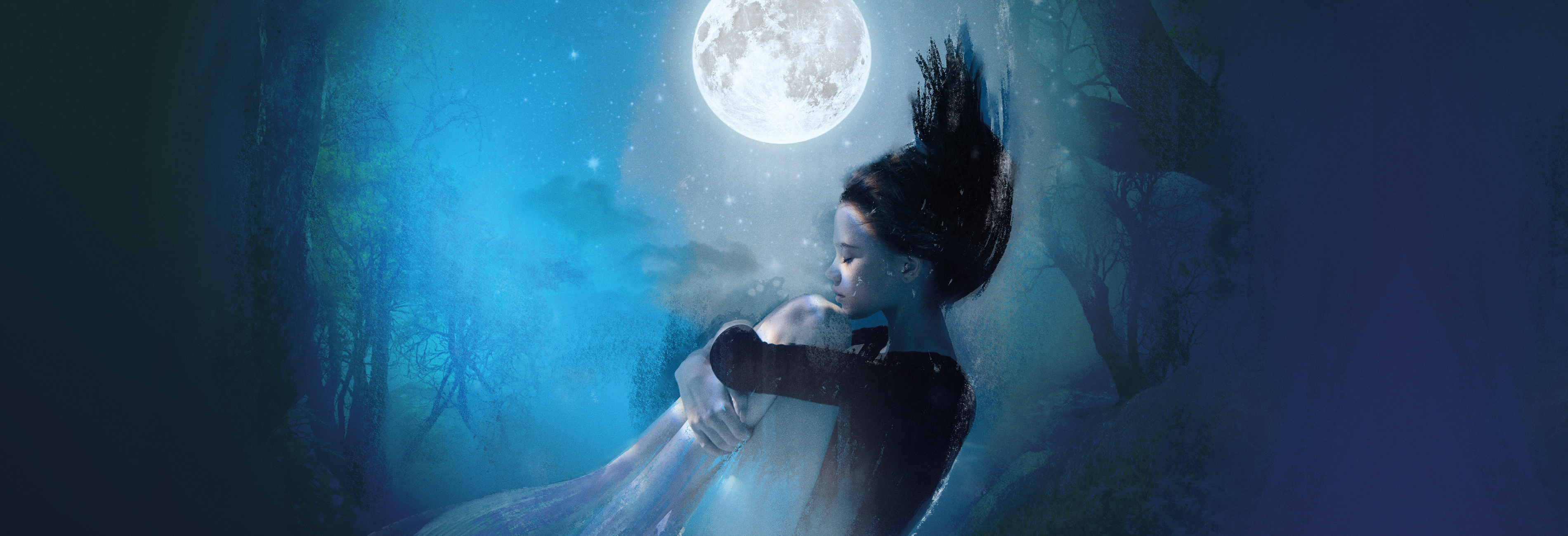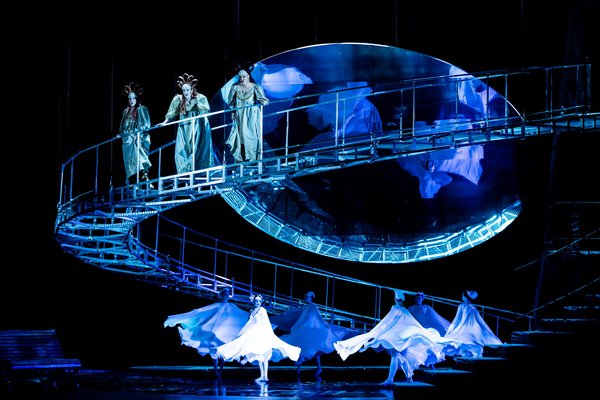
RUSALKA
25 January 2024, 6 p.m.
In Brief
Opera in three acts, in Czech, with Hungarian, English, and Czech subtitles
What could be more dramatic and moving on an opera stage than someone's voice being taken away and they must be silent? Yet this is what happens to Rusalka, the water fairy who lives with her family in the clear waters of a forest lake. When she falls in love with a prince, she sacrifices her voice and leaves home in the hope of finding true love in a new world. Mermaid characters are well-known from different fairy tales and fables, and their stories are told in both in cheerful and tragic versions. The Czech folklore is not lacking the motif used by Antonín Dvořák in his opera Rusalka, which begins as a fairy tale but soon turns into a heart-breaking tragedy. Dvořák's opera was first performed in Prague in 1901. In Budapest, it was presented in guest performances, first by the Bratislava National Theatre in 1956, then the Prague National Theatre in 1976 – and never since. Thus, it is time for the OPERA to present the most iconic work of Czech opera history in its own spectacular production by János Szikora. What could be more fitting an occasion for it than the Slavic Season?
Details
- Location
- Hungarian State Opera
- Date
- Jan. 25, 2024
- Start time
- 6 p.m.
- End time
- 10 p.m.
Synopsis
Act One
Rusalka, the water nymph, has fallen in love with a human being, the Prince, whom she has never met before. She has only seen him from the lake bathing there. The nymph announces her desire to her father, the Water Goblin: she wants to become a human and live on dry land with the Prince. Although her father paints a dark picture of the consequences of becoming a human, the nymph is not discouraged. In the end, the witch Ježibaba is ready to help her become human, but she also reveals a heavy price: if Rusalka does not find true love and returns to the kingdom of water, the man she loves will die. In exchange for her help, she demands Rusalka's voice. Rusalka agrees to the terms of the deal, and Ježibaba gives her a potion. The nymph gets a human body and soul but loses her voice.
The Prince appears at the lake with his fellow huntsmen, and although Rusalka is mute, he is dazzled by the girl's beauty and takes her to his castle. The voice of the Water Goblin and the other nymphs can be heard from the lake: they mourn the loss of Rusalka.
Act Two
In the Prince's castle, the Gamekeeper and the Kitchen Boy are preparing for the wedding of the Prince and Rusalka, and they talk about how strange the new bride is. The Prince enters with the speechless Rusalka at his side. A Foreign Princess appears among the wedding guests, who mocks the nymph, and reproaches the Prince for not caring about the guests and being a bad host. The Prince sends Rusalka to change into a suitable dress for the ball and is left alone with the Foreign Princess, who enchants him…
The Water Goblin appears, and Rusalka runs to her father crying and begging for help, as she feels that the Prince no longer loves her. It is soon confirmed: the man confesses his burning passion for the Foreign Princess, and when Rusalka tries to approach him again, he refuses her. Rusalka and the Water Goblin return to the lake.
Act Three
Rusalka has grown old and lives estranged from her siblings. Rejoicing over Rusalka's failure, Ježibaba once again offers a solution: she hands the nymph a knife with the promise that she can break the curse if Rusalka kills the Prince. Rusalka rejects this notion and disappears into the lake.
The Gamekeeper and the Kitchen Boy come to Ježibaba to ask her for a cure for the Prince, who has been unwell since Rusalka put a curse on him and left. Suddenly, the outraged Water Goblin appears and vows vengeance against the Prince as it was him who betrayed Rusalka. The Gamekeeper and the Kitchen Boy flee.
Desperate and tormented by remorse, the Prince returns to the lake and apologizes to Rusalka, who emerges from the water. The girl warns him that the kiss he longs for can be fatal, but this does not retain the Prince from the embrace that means death for him.
Gallery
Reviews
"Director János Szikora resists the temptation to superimpose false 21st-century “relevance” to the work by shifting it to a space and time more familiar to a contemporary audience. Instead, he works with the composer and librettist’s original concept, to present a “lyric fairy tale” that still enchants more than a century after its first performance."
George Jahn, Bachtrack
